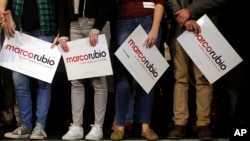Campaign money from shadowy sources is back this election. More than $4 million of it channeled to outside groups helping U.S. presidential candidates has come from unknown or masked donors.
Super political action committees, or super PACs, helping White House hopefuls like Republican Marco Rubio and Democrat Hillary Clinton received big checks recently from obscure corporations or from nonprofits that don't have to disclose their donors' names.
A super PAC backing Rubio, a senator from Florida, benefited from companies with names like “IGX LLC” ($500,000) and “TMCV (hash)2 LLC” ($90,000). The Associated Press traced IGX to a New York investor, and the other to an Idaho billionaire.
Meanwhile, Democratic-leaning American Bridge 21st Century reported more than $1.5 million from its affiliated nonprofit, which doesn't have to name its donors. American Bridge, which said it used the money to pay for expenses like rent and staff, was founded by Clinton supporter David Brock.
The contributions are a reminder of federal court decisions in recent years that loosened prior restrictions in campaign finance laws. That has made it difficult at times to tell who's really supporting candidates, and what favors or influence could be owed should they get elected.
The AP counted more than two dozen groups that each gave at least $50,000 to presidential-aligned super PACs during the last three months of 2015. At least half of those were unrecognizable names like family trusts, real estate holdings or firms that were far from household brands.
The AP pieced together who was behind some of the donations by analyzing more than 80 million campaign finance records, property tax documents and other public records.
The largest, obfuscated super PAC donation was IGX's $500,000, paid to the Rubio-aligned Conservative Solutions PAC. The AP discovered the contribution came from self-described investor and IGX owner Andrew Duncan of New York, whose firm was listed in a prior donation to Rubio.
Rubio has said it's important for people to know the source of political money.
Duncan, who said he worked as a technology executive and has invested in several film productions, acknowledged he was the source of the super PAC donation in emails Tuesday to the AP. Duncan, who funds human rights efforts in China, said he admired Rubio's work on the issue and had used IGX to mask the donation because he was worried about reprisals.
Even frequent contributors whose names appear elsewhere in Federal Election Commission data donated through a variety of companies.
One conservative super PAC donor, Frank VanderSloot from Idaho, gave $150,000 under his own name to Conservative Solutions PAC. Yet records indicate two companies tied to him, TMCV (hash)2 LLC and NG Montana LLC, gave an additional $175,000 to the same PAC, which has so far spent $14.8 million in ads this election, according to political ad tracker Kantar Media.
In an interview, VanderSloot confirmed he was behind the contributions but denied he was trying to hide money. He said the super PAC called him in December requesting more donations, and “that's where we had cash at that moment.”
“Just wait until this year,” VanderSloot said. “We're going to send bucketloads. This was teaspoons.”




